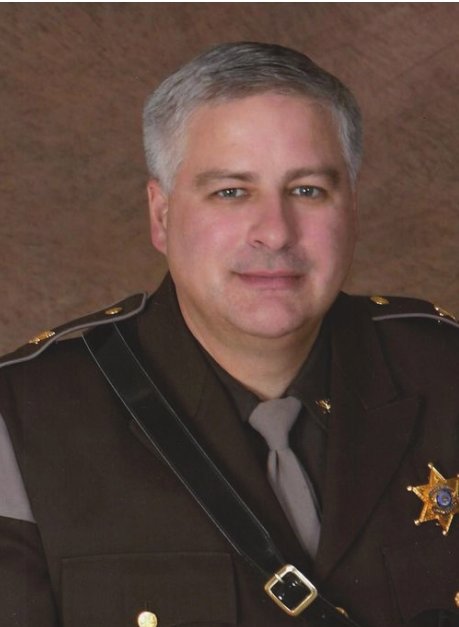
The man eyed Tom Reich, the Eaton County sheriff, as he introduced himself and me, a tag-along reporter. He motioned the sheriff to follow him into the garage, signaling me to stay away. The two spoke in hushed tones, almost conspiratorially.
Just as suddenly as it began, the conversation ended; the man was shaking Reich’s hand and assuring him he’d earned his vote. We walked on.
“He wanted to talk about my divorce,” Reich tells me. “So, we did.”
This heated fight to become the next Eaton County sheriff in Tuesday's General Election is a twisted trail of bitter political attacks focused on two men, Reich and his opponent, former undersheriff Fred McPhail.
Still, the fault line dividing Eaton County in this race is not their private lives. Rather it seems to hinge on a cold February night in 2015 where an Eaton County sergeant stood over the body of an unarmed 17-year-old Mulliken man, Deven Guilford, he’d just shot seven times.
For voters, it’s about the culture of the department and the measure of the sheriff who will lead it.
Both men have decades of experience in law enforcement. McPhail, 52, a Republican, spent 26 years in the Eaton County Sheriff’s Department. Reich, 61, the Democrat finishing his first term, rose through the ranks of the Ingham County Sheriff’s Department, retiring after 25 years. The pitched political battle obscures those resumes.
It features a vehement insistence by McPhail and his supporters that under Reich’s leadership, the department has become militarized and more aggressive in its policing operations in an effort to monetize the department’s work.
“I know when I was undersheriff and Mike Raines was sheriff we were under some pressure to increase court revenues,” McPhail said. “One of the district court judges took us out to lunch and told us that they were down $300,000 in revenues and he wanted us to increase it.”
In other words, Raines and McPhail said the judge wanted the county Sheriff’s Department to write more traffic tickets to pad the court’s treasury.
McPhail said Raines refused to do so, even when the judge, Harvey Hoffman, said without new revenue, the court would have to layoff an employee.

Raines, whom Reich defeated four years ago, confirmed that conversation. Hoffman has retired and was unable to be reached for comment.
McPhail said he was unsure if this same type of pressure for revenue remained, but he suspected it did.
If so, it hasn’t succeeded. Reich noted a Lansing State Journal report earlier this year reviewing the number of tickets written over the last two sheriffs' terms. The data showed a decline of 40 percent, from 10,000 annually at its highest to an average of about 6,000 a year. That data shows the number of tickets has remained consistent under Reich’s leadership with Raines' last year.
McPhail took issue with the department for buying an armored vehicle as well as bayonets from the U.S. military. That is not unusual. Law enforcement agencies across the country have been taking surplus military goods for years — and sometimes raising a great deal of controversy.
Reich said the armored vehicle was necessary to replace an old armored truck —the type used to transport money — because ammunition available today could easily pierced it.
“I am not buying that,” said McPhail. He said the sheriff was “grabbing every little goodie he could.”
Reich said the military vehicle was there to protect his team and civilians, not to militarize the community.
As for the bayonets, Reich said it had been “a mistake” by the deputy, noting they were advertised as knives, not bayonets. “As soon as we saw what they were, we sent them back,” he said.
Reich countered that while McPhail was undersheriff, the department invested in M-16s, something that has not happened under his command. And while some of those weapons remain in Eaton County’s arsenal, they are being phased out as deputies purchase their own long arms.
For the McPhail camp, evidence of aggression and militarization is clearest in the cases of Todd Brenizer and Deven Guilford.
Brenizer was assaulted and arrested by Deputy Gregory Brown in June 2014 during a traffic stop for a broken tail light. The charges levied against Brenizer were dropped after the video he shot on his cellphone was turned over to the department. Brown resigned, only to be hired by the Lenawee County Sheriff ’s Department, where he now faces a civil rights lawsuit for allegedly abusing citizens in that county. Eaton County’s insurer paid Brenizer a $70,000 settlement in July. (See related story, Page 9).
It is the sort of policing actions that McPhail has criticized.
But the controversial shooting death of 17-year-old Guilford continues to divide the community. In February 2015, Guilford was driving home from church when he flashed his car's bright lights to let Sgt. Jonathan Frost know his brights were on. In Michigan, flashing your vehicle's brights at an oncoming one is illegal. Frost responded by pulling the teen over.
In under six minutes, a verbally combative Guilford was lying in a ditch on the side of the road, seven bullet holes in his body. Frost had a bloody face from what he told investigators was a struggle for his weapon — a struggle not caught on video. Frost was cleared of any wrongdoing and continues to patrol Eaton County roads. The Guilford family has filed a federal civil rights lawsuit against the county.
“I would have fired Frost,” said McPhail. “Frost escalated that situation into a confrontation that didn’t need to happen. There were several mistakes in common sense and procedure that didn’t need to happen that led up to that.”
He said with thin road patrols, deputies have to be selective about enforcement so they are not taken off the road for “two or three hours” to process an arrest for a minor traffic offense.
Reich defends Frost. He declined to go indepth in his defense, citing the ongoing litigation.
McPhail also raises concerns that Reich has mismanaged the department’s finances. That’s something he is intimately familiar with. For years, under Raines, he handled budgeting and had to oversee $1 million in cuts — difficult, but necessary.
As evidence of Reich’s mismanagement, he points to an extradition trip Reich took in March 2015. The trip to Anchorage, Alaska, to pick up convicted felon Roger Edmond Smith, who was wanted for violating his parole by committing a robbery and assaulting an officer. The three-day trip cost the county nearly $8,000. Smith was ultimately ordered to reimburse the county for these expenses. Reich and Capt. Timothy Jungel took the trip.
Reich said it is true that using a private contractor to return Smith would have been less expensive, something McPhail raised as an issue. However, Reich said when it was first reviewed, it appeared the contractor would have been more expensive. He said the last-minute nature of the trip resulted in significant cost increases for plane tickets to and from Anchorage.
Policy issues aside, the personal lives of both candidates have colored the race.
Reich is going through a divorce and has been subjected to allegations of domestic violence. She sought a personal protection order against him, a move rejected by a judge in Shiawassee County. But both he and his wife mutually agreed to and signed a restraining order approved by that judge as well. Had the judge issued the PPO against Reich, he would have been barred from carrying a weapon while it was in effect.
“Typically I would say divorce does not belong in a race as a conversation piece,” McPhail said. But then he makes it an issue.
“I think this one is a little different because, based on what I read in the paper, she is accusing him of adultery and years of psychological or emotional abuse. I think if that is true, if either of those cases are true, it should be a factor for voters to consider because if his own wife won’t trust him, if he’s lying to her about his own fidelity, why should the voters trust somebody with that kind of character and lack of integrity?”
Reich said none of those allegations is true.
McPhail’s family life is also under the microscope. Earlier this year his 15-yearold son was charged as an adult for his role in videotaping two underage people — his male friend and a woman —engaging in consensual sex and sending the video to others. The boy is facing criminal sexual conduct charges and has been charged as an adult. On Monday, his case was sent to the Eaton County Circuit Court by the county’s district court.
Here, both men agreed that the charges have nothing to do with the race. McPhail did say that his son’s experience would influence how he oversaw the detectives investigating criminal sexual conduct allegations against teenagers.
“I think it will open my eyes and probably will change my perspective about what the detectives are doing and how we utilize our resources in that regard."
Support City Pulse - Donate Today!
Comments
No comments on this item Please log in to comment by clicking here